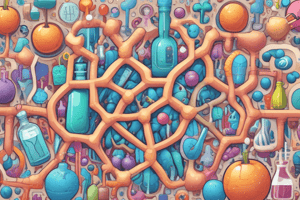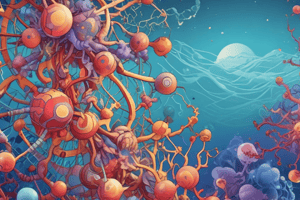Podcast
Questions and Answers
Which of the following is a major drug class of antiviral agents?
Which of the following is a major drug class of antiviral agents?
- Antibacterial drugs
- Antifungal drugs
- Antiparasitic drugs
- Antiviral drugs acting against DNA viruses (correct)
What is the structure-activity relationship (SAR) of antiviral agents?
What is the structure-activity relationship (SAR) of antiviral agents?
The relationship between the chemical structure of a compound and its biological activity.
What type of viruses do Acyclovir specifically target?
What type of viruses do Acyclovir specifically target?
- DNA viruses (correct)
- RNA viruses
- Both DNA and RNA viruses
- None of the above
All viruses contain RNA and DNA.
All viruses contain RNA and DNA.
What is the role of viral thymidine kinase in Acyclovir metabolism?
What is the role of viral thymidine kinase in Acyclovir metabolism?
Acyclovir is a synthetic analogue of ______.
Acyclovir is a synthetic analogue of ______.
Flashcards are hidden until you start studying
Study Notes
Antiviral Agents Overview
- Viruses are non-cellular infectious agents that require host cells for survival and replication.
- All viruses contain either RNA or DNA, never both.
Classification of Antiviral Agents
- Divided into:
- Antiviral drugs for DNA viruses, targeting viral nucleic acid replication.
- Antiviral drugs for RNA viruses, effective against:
- HIV (including Nucleoside Reverse Transcriptase Inhibitors and Protease Inhibitors).
- Influenza virus.
Structure-Activity Relationship (SAR)
- Acyclovir is a synthetic analogue of deoxyguanosine.
- Contains a unique acyclic sugar moiety lacking the 3' hydroxyl group found in cyclic sugars.
Acyclovir Specifics
- Functions as a pro-drug: inactive in its original form but activated within the body.
- Poor bioavailability: only 15-30% is absorbed.
- Metabolically activated by viral thymidine kinase, converting into Acyclovir Monophosphate.
Modes of Action
- Acyclovir disrupts viral DNA replication by mimicking nucleotide components necessary for DNA synthesis.
- Acts specifically on viral replication processes while minimizing effects on host cell DNA.
Metabolic Pathway of Acyclovir
- Active when converted through phosphorylation by viral enzymes, enhancing selectivity against infected cells.
- Continuous research focuses on improving delivery and efficacy for better therapeutic outcomes.
Studying That Suits You
Use AI to generate personalized quizzes and flashcards to suit your learning preferences.




